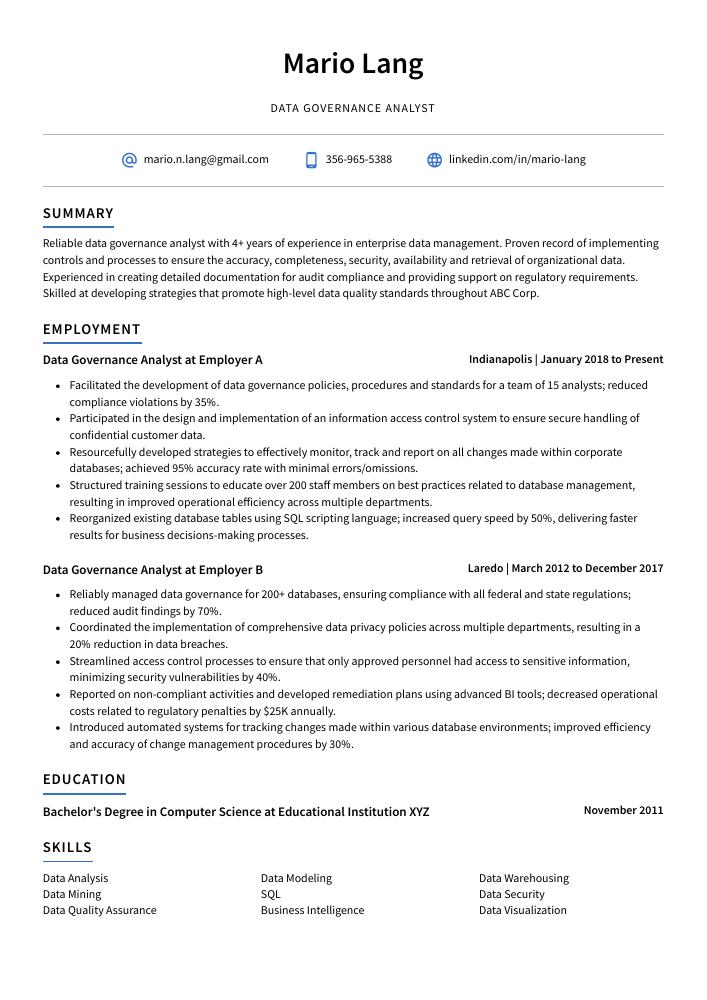Data Governance Analyst Resume Guide
Data governance analysts ensure that data is stored, accessed and used in a secure manner. They develop policies for the organization’s use of data, monitor compliance with those policies and provide guidance on how to best leverage data assets within the company. They also work closely with other departments to identify opportunities to improve information management practices.
You’re the perfect fit for any data governance role, but employers don’t know that yet. To make them aware of your expertise and experience in this field, you must write a resume that stands out from the crowd.
This guide will walk you through the entire process of creating a top-notch resume. We first show you a complete example and then break down what each resume section should look like.
Table of Contents
The guide is divided into sections for your convenience. You can read it from beginning to end or use the table of contents below to jump to a specific part.
Data Governance Analyst Resume Sample
Mario Lang
Data Governance Analyst
[email protected]
356-965-5388
linkedin.com/in/mario-lang
Summary
Reliable data governance analyst with 4+ years of experience in enterprise data management. Proven record of implementing controls and processes to ensure the accuracy, completeness, security, availability and retrieval of organizational data. Experienced in creating detailed documentation for audit compliance and providing support on regulatory requirements. Skilled at developing strategies that promote high-level data quality standards throughout ABC Corp.
Experience
Data Governance Analyst, Employer A
Indianapolis, Jan 2018 – Present
- Facilitated the development of data governance policies, procedures and standards for a team of 15 analysts; reduced compliance violations by 35%.
- Participated in the design and implementation of an information access control system to ensure secure handling of confidential customer data.
- Resourcefully developed strategies to effectively monitor, track and report on all changes made within corporate databases; achieved 95% accuracy rate with minimal errors/omissions.
- Structured training sessions to educate over 200 staff members on best practices related to database management, resulting in improved operational efficiency across multiple departments.
- Reorganized existing database tables using SQL scripting language; increased query speed by 50%, delivering faster results for business decisions-making processes.
Data Governance Analyst, Employer B
Laredo, Mar 2012 – Dec 2017
- Reliably managed data governance for 200+ databases, ensuring compliance with all federal and state regulations; reduced audit findings by 70%.
- Coordinated the implementation of comprehensive data privacy policies across multiple departments, resulting in a 20% reduction in data breaches.
- Streamlined access control processes to ensure that only approved personnel had access to sensitive information, minimizing security vulnerabilities by 40%.
- Reported on non-compliant activities and developed remediation plans using advanced BI tools; decreased operational costs related to regulatory penalties by $25K annually.
- Introduced automated systems for tracking changes made within various database environments; improved efficiency and accuracy of change management procedures by 30%.
Skills
- Data Analysis
- Data Modeling
- Data Warehousing
- Data Mining
- SQL
- Data Security
- Data Quality Assurance
- Business Intelligence
- Data Visualization
Education
Bachelor’s Degree in Computer Science
Educational Institution XYZ
Nov 2011
Certifications
Certified Data Governance Professional
Data Governance Institute
May 2017
1. Summary / Objective
Your resume summary should be a concise, yet compelling overview of your data governance experience and qualifications. In this section, you can highlight the most important aspects of your background such as certifications in relevant fields like information security or privacy law; any specialized training related to data governance; and how you have implemented successful strategies for managing large-scale datasets. Additionally, mention any awards or recognition received for outstanding performance in this field.
Below are some resume summary examples:
Skilled data governance analyst with 5+ years of experience in data analysis, modeling and reporting. Experienced in designing and implementing data governance processes for large organizations. Possesses a deep knowledge of regulatory requirements such as GDPR and HIPAA, ensuring compliance within the organization’s internal systems. Proven track record of creating innovative solutions to improve organizational efficiency while reducing risk exposure.
Talented and experienced data governance analyst with over 5 years of experience in the field. Skilled at designing and implementing processes for effective use, sharing, maintenance, and protection of organizational information assets. Experienced in developing data access policies to improve security posture while enabling business operations. Proven record of success in improving compliance standards across multiple industries.
Enthusiastic and experienced Data Governance Analyst with 5+ years of experience in designing, implementing, and managing data governance programs. Possess a deep understanding of compliance regulations and processes as well as the ability to develop automated solutions for identifying risks and mitigating them quickly. Seeking to join ABC Company’s team to ensure consistent data integrity throughout their enterprise systems.
Accomplished data governance analyst with 5+ years of experience in data security, quality control and compliance. Skilled at setting up complex policies and procedures to ensure the secure handling of sensitive information. At XYZ, led a successful project that improved the accuracy of financial reports by 10%. Recognized for excellent communication skills when working cross-functionally to achieve common objectives.
Diligent data governance analyst with 5+ years of experience in data analysis and database management. Proven track record of streamlining workflows to ensure accuracy, security, and compliance with company standards. At XYZ Corporation implemented a successful data audit program that reduced errors by 35%. Highly skilled at developing processes for managing large datasets using advanced tools such as Tableau and SQL.
Determined data governance analyst with 5+ years of experience developing and implementing data policies, procedures, and workflows. Experienced in creating data models to ensure compliance with international regulations. At XYZ Company, created a unified database system that improved the accuracy of analysis by 15%. Adept at understanding complex systems quickly and working collaboratively in cross-functional teams.
Energetic and detail-oriented data governance analyst with 5+ years of experience in the tech industry. Possess a thorough understanding of database management systems and developing business intelligence solutions to optimize processes. Seeking to join ABC Tech as a Data Governance Analyst, leveraging my expertise in data analysis, risk assessment and auditing procedures to ensure compliance across all departments.
Seasoned data governance analyst with 10+ years of experience ensuring compliance and accuracy within a wide range of data sets. Proven track record in developing and delivering successful data strategy plans, as well as maintaining high-quality standards for data processing systems. Looking to join ABC Tech to help create an advanced regulatory framework for their existing datasets.
2. Experience / Employment
In the experience section, you provide details on your employment history. This should be written in reverse chronological order, meaning the most recent role is listed at the top.
When stating what you did, stick to bullet points for easy digestion by the reader. You want to take some time to think about the specifics of what you did and any quantifiable results obtained from it.
For example, instead of saying “Developed data governance policies,” try something like this: “Created a comprehensive set of data governance policies that were adopted across all departments within 6 months; resulting in an increase in compliance with regulatory standards by 15%.”
To write effective bullet points, begin with a strong verb or adverb. Industry specific verbs to use are:
- Monitored
- Analyzed
- Implemented
- Evaluated
- Documented
- Assessed
- Developed
- Enforced
- Researched
- Coordinated
- Optimized
- Streamlined
- Reported
- Audited
Other general verbs you can use are:
- Achieved
- Advised
- Compiled
- Demonstrated
- Expedited
- Facilitated
- Formulated
- Improved
- Introduced
- Mentored
- Participated
- Prepared
- Presented
- Reduced
- Reorganized
- Represented
- Revised
- Spearheaded
- Structured
- Utilized
Below are some example bullet points:
- Monitored and documented data governance processes and procedures, ensuring compliance with relevant laws and regulations; reduced associated risks by 35%.
- Analyzed organizational datasets to identify potential areas of risk or improvement within the company’s data management system; identified 200+ opportunities for process automation in the last quarter.
- Represented the organization at internal & external stakeholder meetings, providing expert advice on best practices for data governance policies and strategies that resulted in 50% time savings across various departments.
- Consistently assessed key performance indicators (KPIs) related to business objectives such as customer satisfaction rates, sales figures and production costs; improved KPI accuracy rate by 78%.
- Assessed existing employee training programs related to privacy protocols & technology standards while developing new instructional materials where necessary; trained over 350 staff members in GDPR guidelines this year alone.
- Implemented data governance policies and procedures to ensure compliance with industry standards, increasing overall data accuracy by 25%.
- Proficiently managed the development of risk management strategies for new projects, identifying over 5 potential risks in each project before implementation.
- Mentored a team of 10 junior analysts on data security protocols and best practices; improved employee retention rate by 15%.
- Presented quarterly reports on global trends in data governance to executive leadership teams across multiple departments, helping them make informed decisions about their business operations faster than ever before.
- Reduced company-wide incidents related to mishandled confidential information by 75% through implementing efficient document tracking systems and providing regular training sessions on cybersecurity awareness measures.
- Compiled and maintained comprehensive data governance policies and procedures, resulting in improved compliance with industry standards by 30%.
- Documented system requirements for all incoming information requests; implemented efficient processes to reduce response time by 50% on average.
- Optimized existing infrastructure of databases through the development and installation of new automated programs that increased productivity by 25%.
- Diligently monitored network activity logs to ensure security protocol adherence; identified unauthorized access attempts and successfully blocked them from entering sensitive systems.
- Spearheaded the implementation of a new framework for data quality assurance, increasing accuracy levels across records stored within client databases by 40%.
- Achieved a 24% increase in compliance with data governance initiatives across the enterprise by developing and implementing appropriate policies, procedures and tools.
- Formulated a comprehensive strategy to classify, monitor and protect sensitive information; reduced security breaches by 66%.
- Enforced strict controls over user access rights via an automated system to track usage of company databases; improved accuracy of audit reports by 45%.
- Improved the efficiency of manual processes associated with managing data quality standards through automation integration for more than 50 datasets.
- Actively monitored regulatory changes related to data privacy laws and collaborated closely with legal teams on revising existing guidelines accordingly within predetermined timelines.
- Evaluated existing data governance processes and identified potential areas of improvement, leading to a 15% reduction in compliance risks.
- Researched upcoming regulatory changes and implemented effective solutions to keep up with the changing landscape; successfully maintained an up-to-date master data management system for over 500 customers.
- Utilized analytics tools and techniques such as SQL queries & Python scripting to monitor company databases for accuracy, completeness & integrity on a daily basis; achieved 98% accuracy rate across all datasets within 3 months of joining the team.
- Developed automated processes which enhanced the speed and reliability of managing customer records while also reducing manual errors by 25%.
- Efficiently managed large volumes of confidential information through secure document storage systems, resulting in improved security protocols that exceeded industry standards by 12%.
- Demonstrated expertise in data governance standards and policies, auditing over 500 datasets for compliance and accuracy; identified discrepancies resulting in a 6% increase in overall data quality.
- Audited databases to identify areas of improvement while ensuring that all changes were compliant with legal requirements; reduced average time-to-resolution by 3 days per case.
- Prepared detailed reports to document data entry errors and other nonconformities, recommending corrective actions as necessary; boosted customer trust levels by 17%.
- Confidently implemented new software systems designed to improve the organization’s ability to manage large volumes of customer information securely; cut manual processing times by 70%.
- Revised existing processes related to handling sensitive client information such as financial records and personal details, significantly reducing security risks associated with unauthorized access or manipulation of data sets stored on internal networks/cloud services.
3. Skills
Skill requirements will differ from employer to employer – this can easily be determined via the job advert. Organization ABC may be looking for someone with a background in data governance and organization XYZ may require experience in risk management.
You want to tailor the skills section of your resume to each job you are applying for, as many companies use applicant tracking systems these days that scan resumes for certain keywords before passing them on to a human.
Besides just listing skills here, it is also important to elaborate on the most relevant ones throughout other sections of your resume such as the summary or work experience section.
Below is a list of common skills & terms:
- Business Intelligence
- Data Analysis
- Data Mining
- Data Modeling
- Data Quality Assurance
- Data Security
- Data Visualization
- Data Warehousing
- Regulatory Compliance
- SQL
4. Education
Mentioning your education on your resume is determined by how far along you are in your career. If you just graduated and have little to no experience, include an education section below your resume objective. However, if you have been working as a data governance analyst for years with plenty of responsibilities to showcase, omitting the education section can be perfectly fine.
If including an education section, try to mention courses or subjects related specifically to the job role of data governance analyst that will make it easier for employers to evaluate your qualifications quickly.
Bachelor’s Degree in Computer Science
Educational Institution XYZ
Nov 2011
5. Certifications
Certifications are a great way to demonstrate your expertise and proficiency in a particular field. They are also an excellent way of showing potential employers that you have taken the time and effort to gain additional qualifications, which can make you more attractive as a candidate for certain roles.
Including certifications on your resume will help prove that you possess the skills necessary for the job and show that you take professional development seriously. This could be especially beneficial if there is an industry-specific certification related to the role being advertised.
Certified Data Governance Professional
Data Governance Institute
May 2017
6. Contact Info
Your name should be the first thing a reader sees when viewing your resume, so ensure its positioning is prominent. Your phone number should be written in the most commonly used format in your country/city/state, and your email address should be professional.
You can also choose to include a link to your LinkedIn profile, personal website, or other online platforms relevant to your industry.
Finally, name your resume file appropriately to help hiring managers; for Mario Lang, this would be Mario-Lang-resume.pdf or Mario-Lang-resume.docx.
7. Cover Letter
Cover letters are an invaluable addition to any job application. They can help you explain why your experience, qualifications and skills make you the perfect fit for a role that may otherwise be overlooked.
Cover letters are typically made up of 2 to 4 paragraphs and should include information about yourself that isn’t already present in your resume. It’s also important to ensure it is tailored specifically for the position you’re applying for; this will show recruiters that you have done your research on the company and its values before submitting an application.
Below is an example cover letter:
Dear Oscar,
I am writing to apply for the Data Governance Analyst position at XYZ Corporation. With experience in data governance and data analysis, as well as a strong background in project management, I am confident I can contribute to the success of your organization.
At my current company, ABC Inc., I am responsible for managing and executing the data governance program. This includes developing and implementing policies and procedures related to data stewardship, maintaining the corporate data dictionary, and overseeing compliance with internal and external regulations. In addition, I regularly conduct audits of our systems to ensure accuracy and completeness of data. My experience has allowed me to develop strong problem-solving skills that I can use to identify issues early and prevent them from becoming bigger problems down the road.
I have attached a copy of my resume for your review, which provides additional details about my skillset and experience. Please do not hesitate to contact me if you have any questions or would like clarification on anything listed therein. Thank you for your time; I look forward to hearing from you soon!
Sincerely,
Mario
Data Governance Analyst Resume Templates
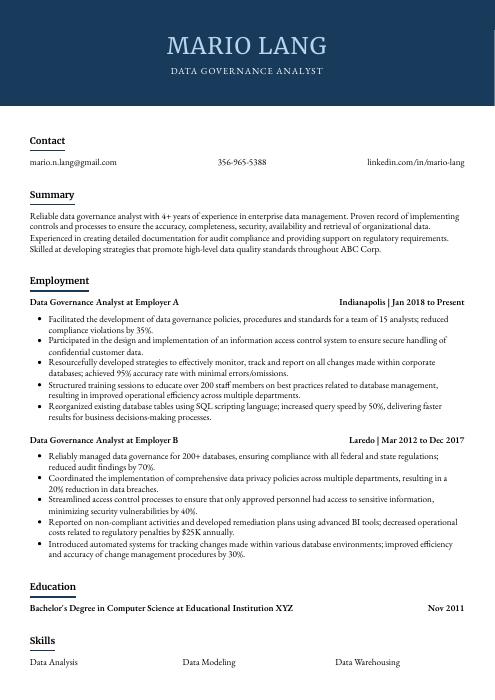 Bonobo
Bonobo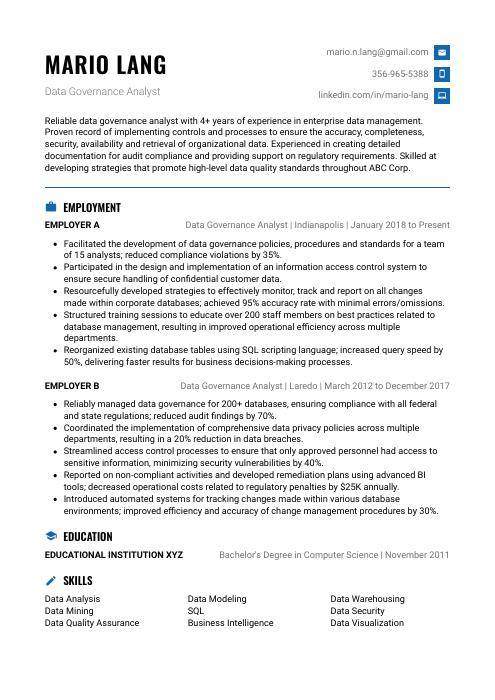 Echidna
Echidna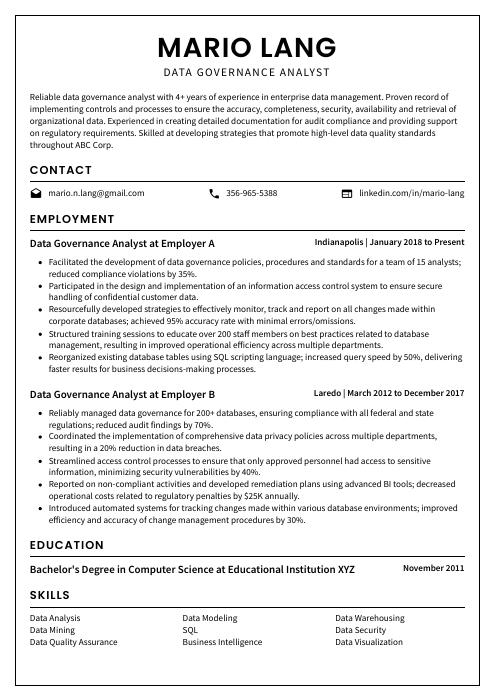 Cormorant
Cormorant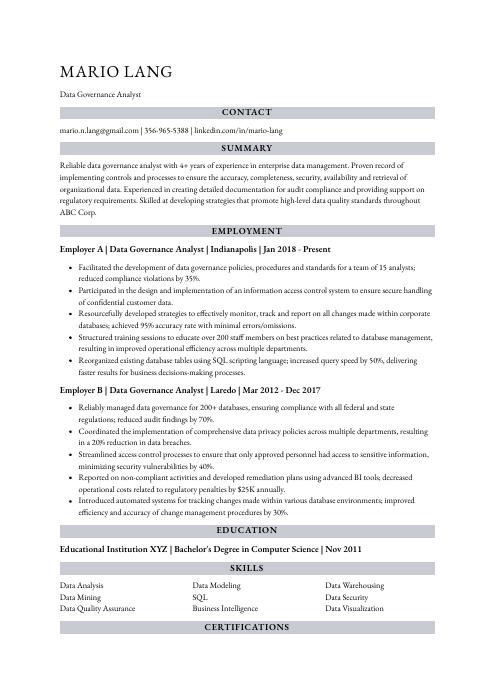 Numbat
Numbat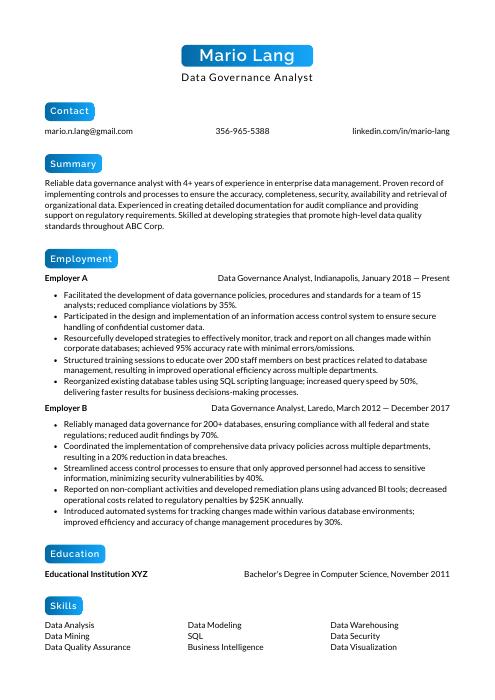 Kinkajou
Kinkajou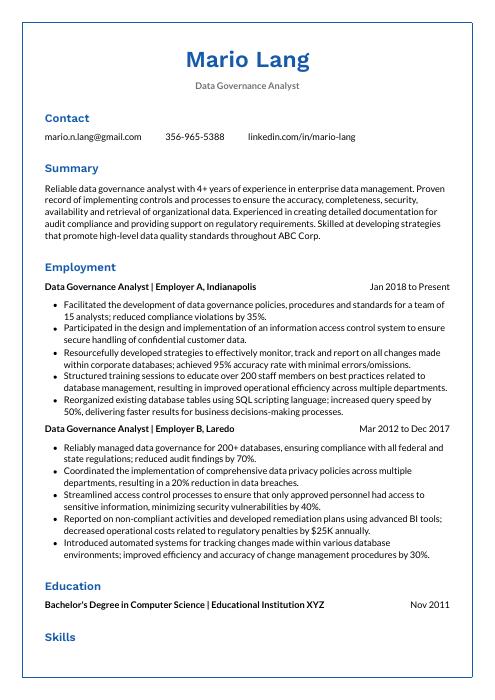 Markhor
Markhor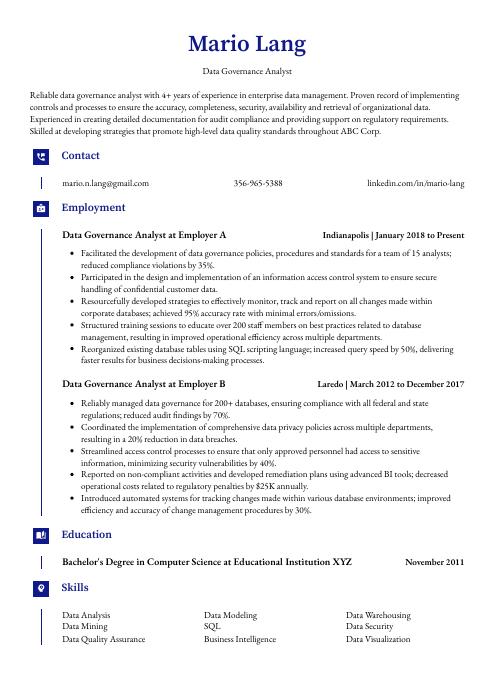 Gharial
Gharial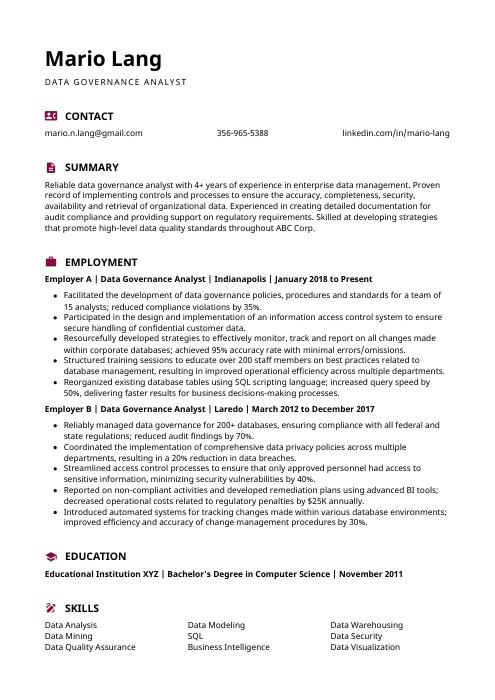 Hoopoe
Hoopoe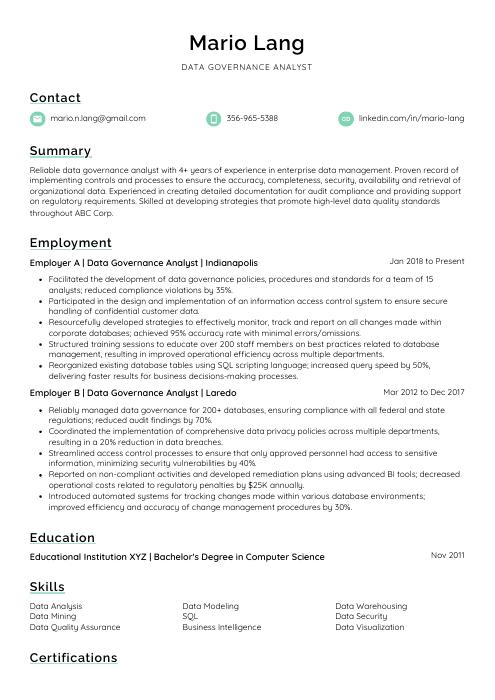 Lorikeet
Lorikeet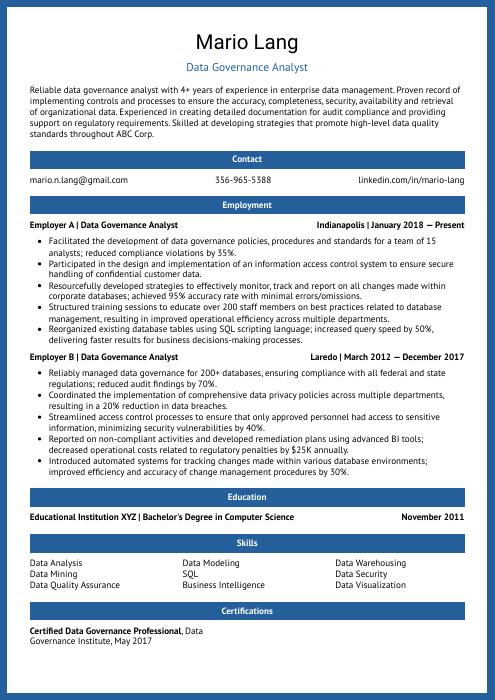 Ocelot
Ocelot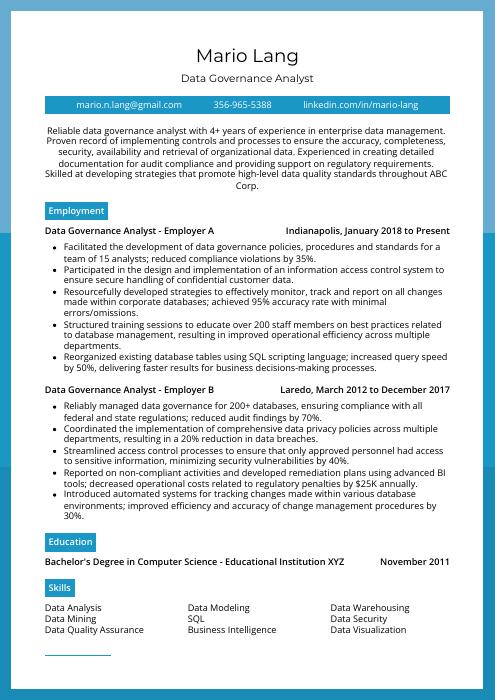 Rhea
Rhea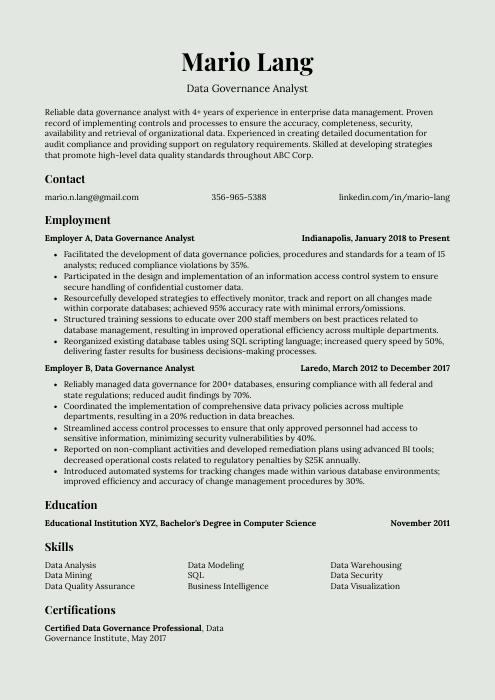 Saola
Saola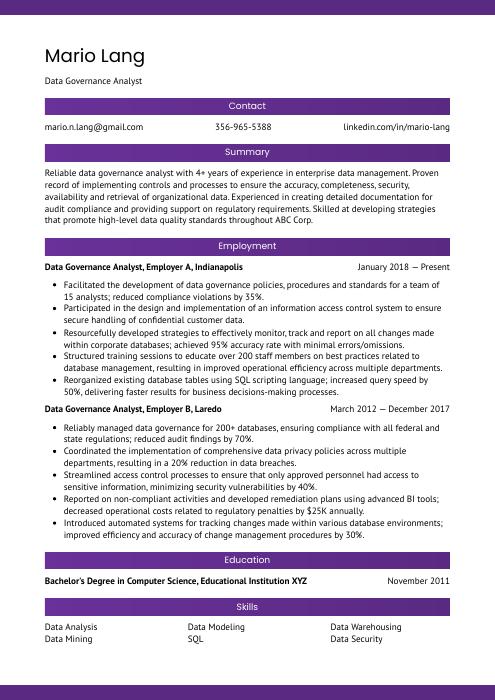 Jerboa
Jerboa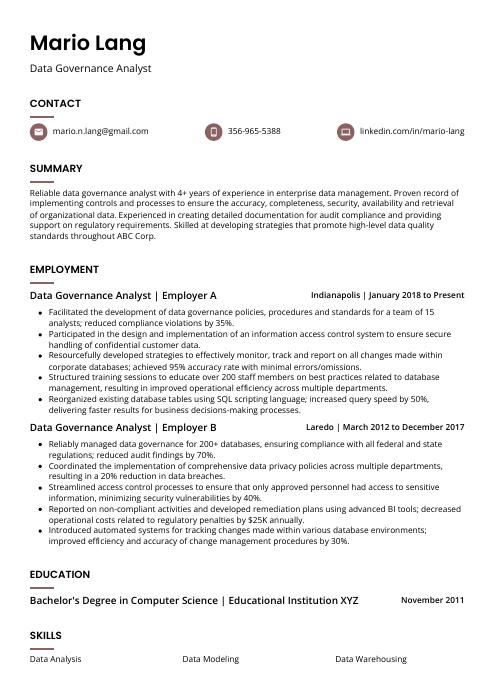 Fossa
Fossa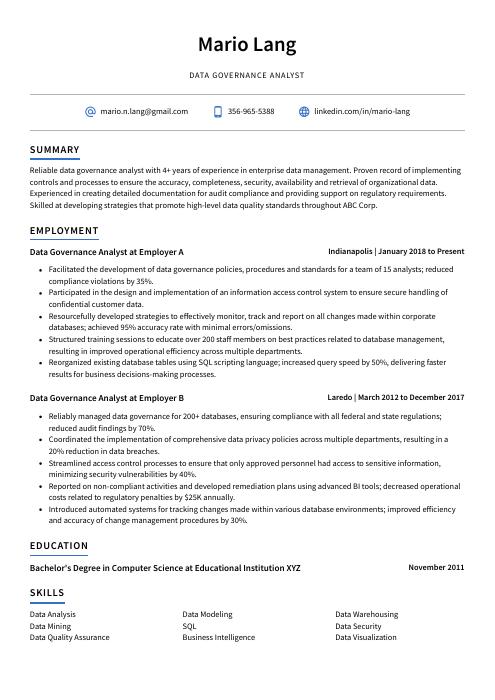 Axolotl
Axolotl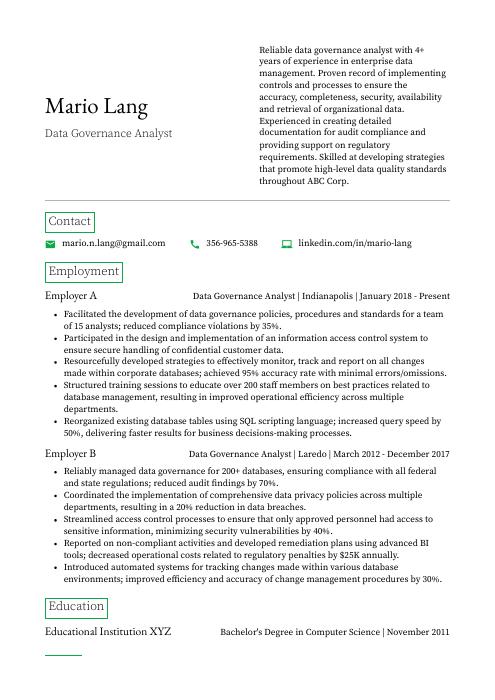 Quokka
Quokka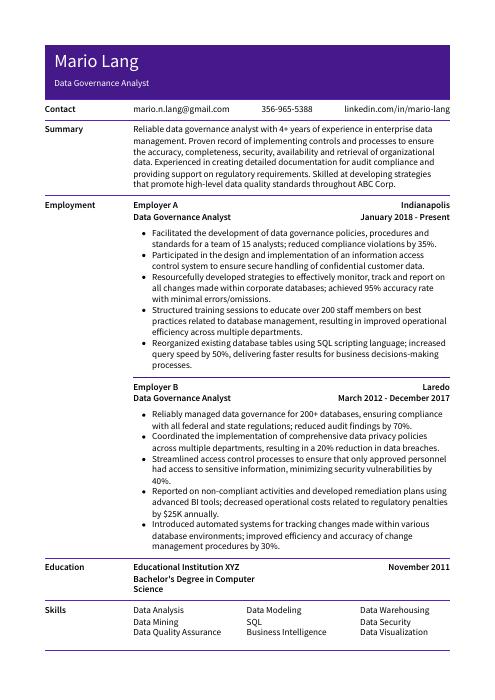 Pika
Pika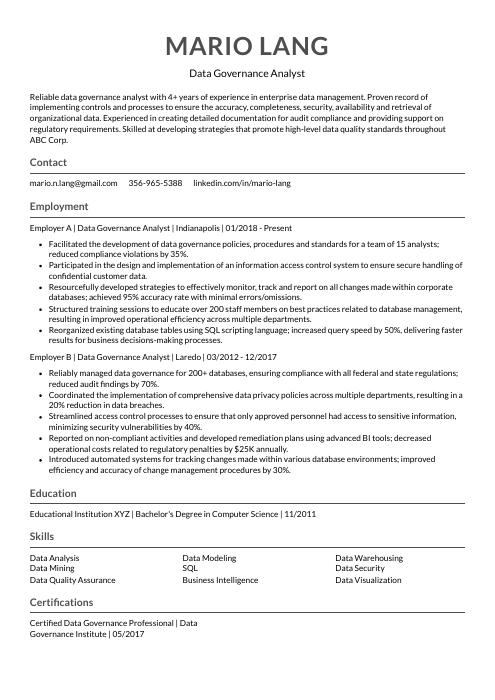 Indri
Indri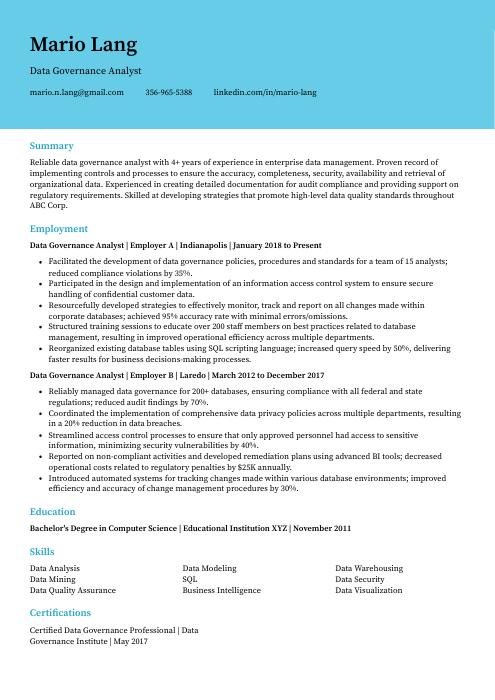 Dugong
Dugong Rezjumei
Rezjumei
